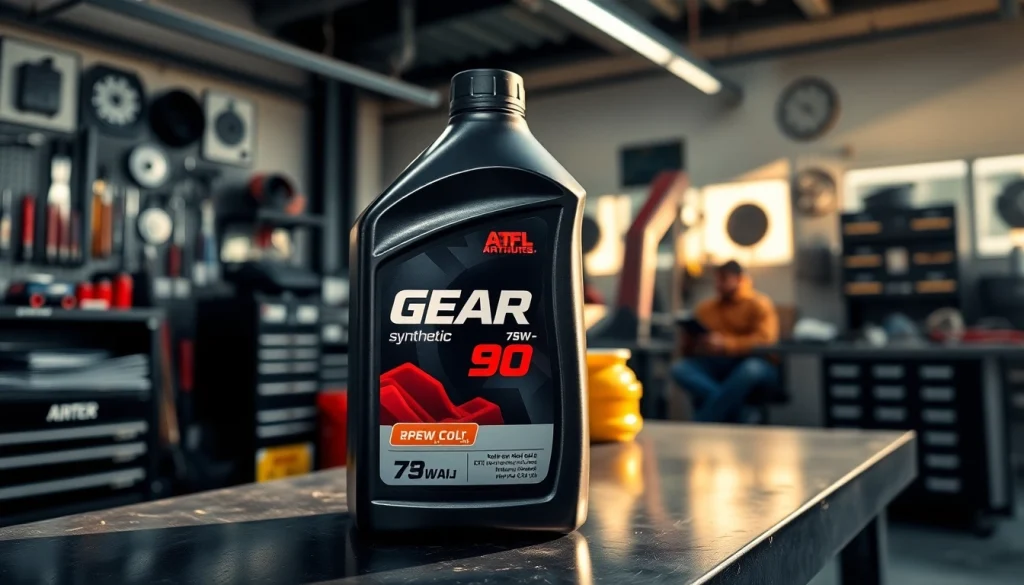
Understanding Gear Oil 75W90 Synthetic
What is Gear Oil?
Gear oil is a specialized lubricant formulated to reduce friction between the moving parts of gears, bearings, and other components of your vehicle’s drivetrain. Unlike engine oils that serve a broader range of needs, gear oils are specifically designed to endure the higher pressures and temperatures found in gear systems. They help to prevent wear, reduce heat, and protect components from corrosion.
The Benefits of Synthetic Gear Oil
Synthetic gear oils, like gear oil 75w90 synthetic, offer several advantages over their conventional counterparts. They are engineered using artificial compounds that provide superior performance, enhancing the durability and lifespan of gear systems. Some notable benefits include:
- Improved Temperature Resistance: Synthetic oils maintain their viscosity and effectiveness over a wide temperature range, making them suitable for both extreme cold and high-heat environments.
- Enhanced Lubrication: They feature low friction characteristics that help reduce wear on gears and bearings, significantly extending the life of these components.
- Better Oxidation Stability: Synthetic gear oils resist breaking down and losing their desirable properties over time, leading to longer service intervals.
- Fuel Efficiency: Lower friction translates to better fuel economy, especially in vehicles where drivetrain efficiency is critical.
75W90 Synthetic Gear Oil: Key Features
75W90 synthetic gear oil is formulated to provide optimal performance in various applications, including manual transmissions, differentials, and transfer cases. The numbers in 75W90 indicate the oil’s viscosity grades: “75” represents the low-temperature viscosity, while “90” signifies the high-temperature viscosity. This means that 75W90 gear oil flows effectively in cold conditions while maintaining stability at high temperatures. Additional key features include:
- Advanced Additive Technology: Many synthetic gear oils include specialized additives that enhance performance characteristics like anti-wear and anti-foam properties.
- Noise Reduction: The use of synthetic formulations can result in quieter operation, especially in performance-oriented applications.
- Compatibility with Seals: Synthetic oils often provide superior wear resistance and compatibility with the seals in transmission and differential applications, reducing the risk of leaks.
Applications of Gear Oil 75W90 Synthetic
Vehicles That Benefit from 75W90 Synthetic Gear Oil
75W90 synthetic gear oil is particularly beneficial for a wide variety of vehicles, especially those requiring high-performance lubricants. Applications include:
- Sports Cars: Vehicles that undergo extreme driving conditions or high-speed maneuvers often see significant benefits from using synthetic gear oils, which can handle the increased stress.
- Trucks and SUVs: Heavier vehicles loaded with more weight and structure can benefit from the enhanced protection and performance of synthetic oils, particularly in their differential assemblies.
- Commercial Vehicles: Heavy-duty vehicles that operate under significant loads and harsh conditions are ideal candidates for 75W90 gear oil to maintain operational efficiency.
How to Choose the Right Gear Oil for Your Vehicle
Selecting the correct gear oil is crucial for vehicle performance. Here are steps to guide you:
- Consult the Owner’s Manual: Always refer to the vehicle’s manual for recommended specifications on gear oil, including viscosity and type.
- Understand Driving Conditions: Consider whether your vehicle operates in extreme temperatures or heavy conditions, as this may affect oil choice.
- Consider Vehicle Age: Older vehicles may benefit from formulations with additives designed to revitalize aging components.
Common Misconceptions About Gear Oils
Misunderstandings about gear oil can lead to performance issues. Here are a few common misconceptions:
- All Gear Oils Are the Same: Different gear oils serve different purposes. Always choose one that meets your manufacturer’s specifications.
- Replacing Gear Oil Isn’t Necessary: Regular maintenance and timely oil changes are critical for preventing gear wear and tear.
- More Expensive Means Better: While some higher-priced oils may offer advanced formulations, it is essential to balance cost with performance and suitability for your vehicle.
Maintenance Tips for Using Gear Oil 75W90 Synthetic
Recommended Change Intervals for Gear Oil
Changing your gear oil at regular intervals is vital to maintain the health of your vehicle’s transmission and differential systems. The following are general guidelines for change intervals:
- For most passenger vehicles, change the gear oil every 30,000 to 60,000 miles.
- For heavy-duty or performance vehicles, consider changing gear oil more frequently, possibly every 15,000 to 30,000 miles depending on usage.
- For extreme conditions (heavy hauling, off-roading, racing), inspect gear fluid regularly and change as needed.
Signs That You Need a Gear Oil Change
Recognizing the signs of needing a gear oil change can prevent costly repairs:
- Unusual Noises: Grinding, whining, or clunking noises can indicate low or degraded gear oil.
- Fluid Leaks: Finding oily spots beneath your vehicle can suggest a leak, requiring inspection and potential oil change.
- Poor Performance: Any noticeable decline in vehicle handling, especially during turns or acceleration, may be linked to faulty gear oil.
Proper Disposal of Old Gear Oil
Used gear oil must be discarded responsibly to prevent environmental contamination. Follow these guidelines:
- Do Not Dump: Never dispose of gear oil in regular trash or down drains.
- Recycling Centers: Many places have recycling centers that accept used oil for proper processing.
- Local Auto Parts Stores: Some stores collect used oil for recycling. Check your local options.
Comparative Analysis: Gear Oil 75W90 Synthetic vs. Conventional Gear Oil
Performance in Extreme Conditions
When it comes to extreme conditions, synthetic gear oils outperform conventional oils:
- Synthetic gear oils maintain their viscosity and lubricating properties at both high and low temperatures, which conventional oils may not.
- Under high-stress conditions, synthetic oils provide improved protection against wear and thermal breakdown.
Cost Considerations for Synthetic vs. Conventional Oils
While synthetic gear oil often comes with a higher initial price, it can lead to savings in the long run:
- Longer intervals between oil changes reduce maintenance costs.
- The enhanced protection afforded by synthetic oils can lead to lower repair bills on drivetrain components.
Real-World Performance Comparisons
When tested under similar conditions, vehicles using synthetic gear oil generally experience less wear and tear than those using conventional oils. Case studies and real-world tests have shown:
- A fleet of delivery trucks using synthetic oils reported 15% lower repair and maintenance costs compared to those using conventional lubricants.
- A performance car running on synthetic gear oil exhibited significantly improved handling and reduced noise levels, compared to the same model using conventional gear oil.
FAQs about Gear Oil 75W90 Synthetic
What Makes 75W90 Synthetic Gear Oil Ideal for High-Performance Vehicles?
The unique formulation of 75W90 synthetic gear oil provides superior lubrication under high-performance conditions. The synthetic base stocks and advanced additives ensure that the viscosity remains stable under varying temperatures and stresses, protecting gears from wear and ensuring reliable operation during high-speed or heavy-load scenarios.
Is Synthetic Gear Oil Compatible with My Transmission?
Most modern vehicles are compatible with synthetic gear oils, but it’s crucial to check your vehicle’s owner’s manual for specific recommendations. Certain vehicles may have unique requirements for transmission and differential lubricants, and using the wrong type can cause significant damage.
How Does 75W90 Synthetic Gear Oil Impact Fuel Efficiency?
Synthetic gear oils like 75W90 can positively impact fuel efficiency due to their lower friction characteristics, resulting in less energy being wasted as heat in your vehicle’s drivetrain. This increased efficiency translates directly into improved fuel economy, helping to save costs at the pump over time.






